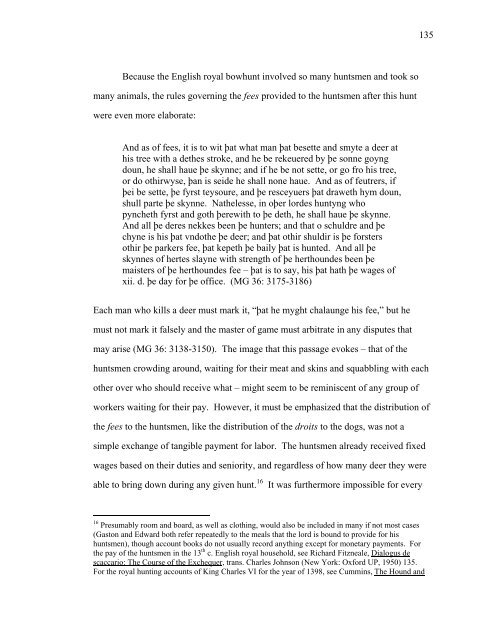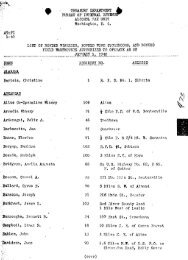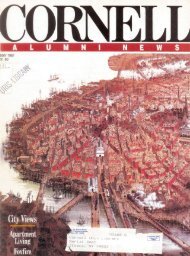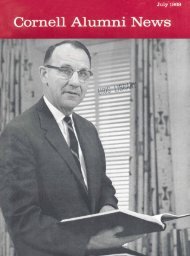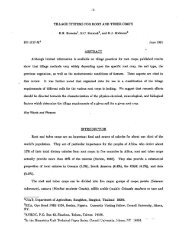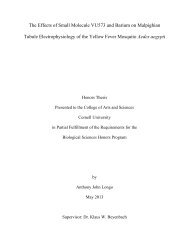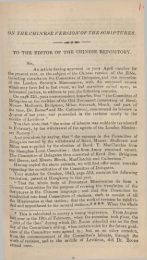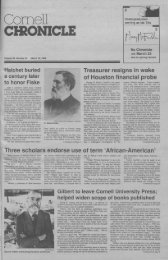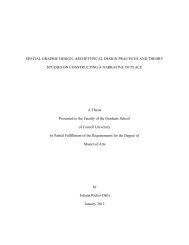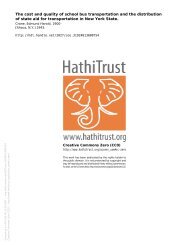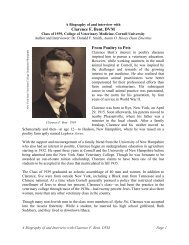Chapter 4 The Gift.pdf - eCommons@Cornell
Chapter 4 The Gift.pdf - eCommons@Cornell
Chapter 4 The Gift.pdf - eCommons@Cornell
Create successful ePaper yourself
Turn your PDF publications into a flip-book with our unique Google optimized e-Paper software.
Because the English royal bowhunt involved so many huntsmen and took so<br />
many animals, the rules governing the fees provided to the huntsmen after this hunt<br />
were even more elaborate:<br />
And as of fees, it is to wit þat what man þat besette and smyte a deer at<br />
his tree with a dethes stroke, and he be rekeuered by þe sonne goyng<br />
doun, he shall haue þe skynne; and if he be not sette, or go fro his tree,<br />
or do othirwyse, þan is seide he shall none haue. And as of feutrers, if<br />
þei be sette, þe fyrst teysoure, and þe resceyuers þat draweth hym doun,<br />
shull parte þe skynne. Nathelesse, in oþer lordes huntyng who<br />
pyncheth fyrst and goth þerewith to þe deth, he shall haue þe skynne.<br />
And all þe deres nekkes been þe hunters; and that o schuldre and þe<br />
chyne is his þat vndothe þe deer; and þat othir shuldir is þe forsters<br />
othir þe parkers fee, þat kepeth þe baily þat is hunted. And all þe<br />
skynnes of hertes slayne with strength of þe herthoundes been þe<br />
maisters of þe herthoundes fee – þat is to say, his þat hath þe wages of<br />
xii. d. þe day for þe office. (MG 36: 3175-3186)<br />
Each man who kills a deer must mark it, “þat he myght chalaunge his fee,” but he<br />
must not mark it falsely and the master of game must arbitrate in any disputes that<br />
may arise (MG 36: 3138-3150). <strong>The</strong> image that this passage evokes – that of the<br />
huntsmen crowding around, waiting for their meat and skins and squabbling with each<br />
other over who should receive what – might seem to be reminiscent of any group of<br />
workers waiting for their pay. However, it must be emphasized that the distribution of<br />
the fees to the huntsmen, like the distribution of the droits to the dogs, was not a<br />
simple exchange of tangible payment for labor. <strong>The</strong> huntsmen already received fixed<br />
wages based on their duties and seniority, and regardless of how many deer they were<br />
able to bring down during any given hunt. 16 It was furthermore impossible for every<br />
16 Presumably room and board, as well as clothing, would also be included in many if not most cases<br />
(Gaston and Edward both refer repeatedly to the meals that the lord is bound to provide for his<br />
huntsmen), though account books do not usually record anything except for monetary payments. For<br />
the pay of the huntsmen in the 13 th c. English royal household, see Richard Fitzneale, Dialogus de<br />
scaccario: <strong>The</strong> Course of the Exchequer, trans. Charles Johnson (New York: Oxford UP, 1950) 135.<br />
For the royal hunting accounts of King Charles VI for the year of 1398, see Cummins, <strong>The</strong> Hound and<br />
135


